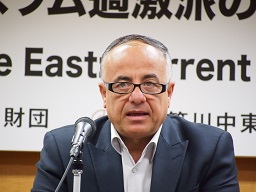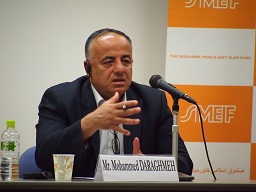
2015.06.15
 At the invitation of the Sasakawa Middle East Islam Fund, a veteran journalist Mr. Mohammed Daraghmeh gave a lecture entitled "Extremism in the Middle East: Situation and Prospects" on Tuesday, 2 June 2015. Mr. Daraghmeh, a senior correspondent of the Associted Press based in Ramallah, has been reporting the Palestinian development for decades with extensive knowledge of the political organizations and Islamic extremists in the region. In this lecture he addressed how people in the region view such Islamic extremist groups including Islamic State group (IS). Mr. Nobuhisa Degawa, Senior Commentator of NHK and an expert on the Middle East moderated the Q&A session.
At the invitation of the Sasakawa Middle East Islam Fund, a veteran journalist Mr. Mohammed Daraghmeh gave a lecture entitled "Extremism in the Middle East: Situation and Prospects" on Tuesday, 2 June 2015. Mr. Daraghmeh, a senior correspondent of the Associted Press based in Ramallah, has been reporting the Palestinian development for decades with extensive knowledge of the political organizations and Islamic extremists in the region. In this lecture he addressed how people in the region view such Islamic extremist groups including Islamic State group (IS). Mr. Nobuhisa Degawa, Senior Commentator of NHK and an expert on the Middle East moderated the Q&A session.
■ The Background of Islamic Extremism
I would say that the roots of IS and its mother Al-Qaeda go back to the 1980s when people in the Middle East lost faith in all modern ideologies to change their reality. Young people joined all kinds of modern political parties; liberal, communist, nationalist, democratic ones to challenge the corruption and the autocracy but all attempts have failed. At this point political Islam, the Islamic political movements, emerged as the alternative to both the regimes and the modern political movements. IS was founded in Iraq by a group of AL-Qaeda fighters who fought in Afghanistan, on helm of them was Abu Musab al-Zarqawi, the Jordanian jihadist who moved into Iraq following the American invasion in 2003. Al-Zarqai formed the first level of IS called "Al-Tawheed and Al-Jihad" and carried out series of deadly attacks against the American forces in Iraq. They developed the organization, changing the name into "Islamic State in Iraq and Levant (ISIL), and declared what they regard as the Caliphate state, IS in 2014.
■ Attractive to Youth
 I went to Jordan several times in the past two years to report on the Jordanian fighters in the Jihadi groups in Syria and Iraq. And I visited families of a suicide bomber and other Jihadists as well as interviewing people on the streets and found deep support to IS and al-Nusra Front among them. They were all saying that the former Islamic State, the Caliphate in the era of the prophet Mohammed and his fellows was the greatest achievement in the history of this region. They were also saying Muslims were most-advanced militarily, economically and scientifically during the period. Meanwhile, however, they complained loudly that at present there is no real election, no opportunity for jobs, sons and daughters of the officials are driving luxury cars...Not a few young activists welcome the idea of IS coming to Jordan to revive the old Islamic Caliphate.
I went to Jordan several times in the past two years to report on the Jordanian fighters in the Jihadi groups in Syria and Iraq. And I visited families of a suicide bomber and other Jihadists as well as interviewing people on the streets and found deep support to IS and al-Nusra Front among them. They were all saying that the former Islamic State, the Caliphate in the era of the prophet Mohammed and his fellows was the greatest achievement in the history of this region. They were also saying Muslims were most-advanced militarily, economically and scientifically during the period. Meanwhile, however, they complained loudly that at present there is no real election, no opportunity for jobs, sons and daughters of the officials are driving luxury cars...Not a few young activists welcome the idea of IS coming to Jordan to revive the old Islamic Caliphate.
■ School Education and Mosques
Muslim people in the Middle East are raised on the idea of Caliphate. I've just finished reviewing the school books in Jordan. I've reviewed the religion, History, Arabic language and civic books where I found a lot about the greatness of the past Caliphate, which also mention the past incidents of beheading and slavery. While these books repeat that Islam is the final God message, they don't talk about the other religions and beliefs. The same message student receive in schools is delivered to a wider audience in mosques. Considering many people in the region attend Friday Prayers and listen to the sermon, we can say that the idea of the Caliphate does not sound unfamiliar in the region.
■ To overcome IS
I assume that democratic regimes create democratic oppositions and brutal regimes create brutal oppositions. In Syria and Iraq, the brutality of the regimes against the Sunnis was the main reason of driving a majority of the oppressed people to join the extremist groups. So, I believe that the only way to fight against IS is to modernize the societies by having real elections and democracy, improving the education system and modernizing the religious messages in schools and mosques.